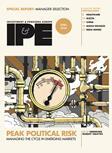Global environmental movement Extinction Rebellion is targeting Somerset County Council Pension Fund with a protest outside the offices of Somerset West and Taunton Council on Friday 28 August at 12pm UK time, as part of its ‘We want to live…’ campaign.
On a social media post, Extinction Rebellion said the protest is against Somerset County Council pensions committee’s continued investment in fossil fuels, despite the fact that the county council and four district councils declared a climate emergency in February 2019.
The post claims that companies such as Shell and Exxon are planning to expand fossil fuel extraction significantly by 2030. “This is incompatible with the declaration made by Somerset County Council and the four district councils in Somerset to reduce carbon emissions to net zero by 2030,” it said.
Nearly 8% of of the pension fund’s £2bn (€2.2bn) assets are invested in companies that fuel the climate and ecological crises. These include companies like BP, Royal Dutch Shell, Rio Tinto and Exxon Mobil, Extinction Rebellion stated.
The council’s pensions committee did not respond to IPE’s request for comment.
Extinction Rebellion’s post also said the protest would be peaceful, non-disruptive and socially distanced.
Similar protests will take place across the county – outside the district council offices in Bridgwater, Shepton Mallet and Yeovil – that day, and at other locations in the South West, the group announced.
Aon: smaller bulk annuity transactions soar
Consultancy Aon has said that favourable market dynamics in the first half of 2020 led to an increase in the number of smaller bulk annuity transactions relative to recent years.
The first half of 2020 saw a near 20% increase in the number of smaller transactions – below £100m (€109m) – compared to the same period last year.
The firm expects this trend to accelerate through the remainder of 2020, it said.
Its analysis of the market and views from insurers show that several factors contributed to the favourable conditions for smaller transactions:
- Fewer jumbo transactions in the market compared to last year, which has meant insurers have had more capital and manpower to deploy across a wider spectrum of transactions;
- An increase in the use of streamlined auction processes for smaller transactions – which particularly helped during recent volatile market conditions;
- Insurers investing in technology and operational capacity at the smaller end of the market, to increase supply for smaller schemes looking to de-risk.
Stephen Purves, partner at Aon, said: “There has been a misconception that smaller schemes struggle to access competitive pricing from insurers, so it is really pleasing to see them taking advantage of these market opportunities and transacting in the first half of 2020.”
He said that several factors – including the impact of COVID-19, market volatility and an increased insurer capacity – have led to many more smaller transactions taking place.
“This is particularly so when compared to recent years in which larger transactions have dominated – and maybe it has changed the perception of the sort of schemes that should and can come to market,” he explained.
PLSA releases climate indexes guide
Today the Pensions and Lifetime Savings Association (PLSA) has published the Climate Indexes Made Simple guide, which is sponsored by MSCI, as is designed to help scheme trustees understand how climate change indexes work and how they can help mitigate risk and promote good stewardship.
PLSA said that climate change is “becoming one of the most important long-term investment risk factors, meaning trustees have an increasing need to measure and manage climate risk and to build climate resilient investment portfolios”.
At the PLSA Investment Conference 2020, pensions minister Guy Opperman made this clear when he said: “If you are in the pensions and savings business, you start with the fundamental principle that you believe saving should be done for the longer term. If you aren’t addressing climate change, there is no longer term. It is the defining issue of the 21st century.”
In the guide, Remy Briand, head of ESG at MSCI, said that until now, measuring the potential impact of transitional or physical risks or the economic impact of climate change on portfolios was limited due to the lack of tools available to investors.
“We believe climate change will become the most important investment risk factor over the long-term,” he added.












No comments yet